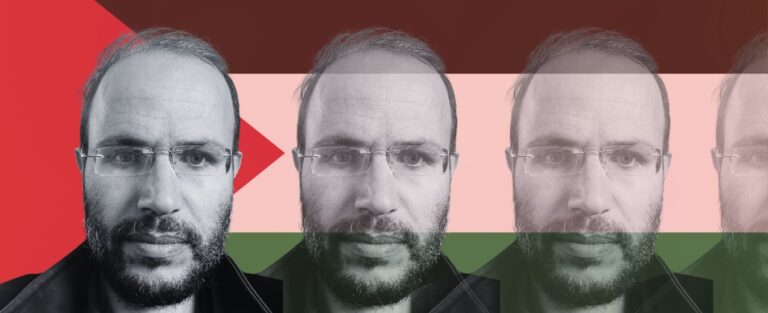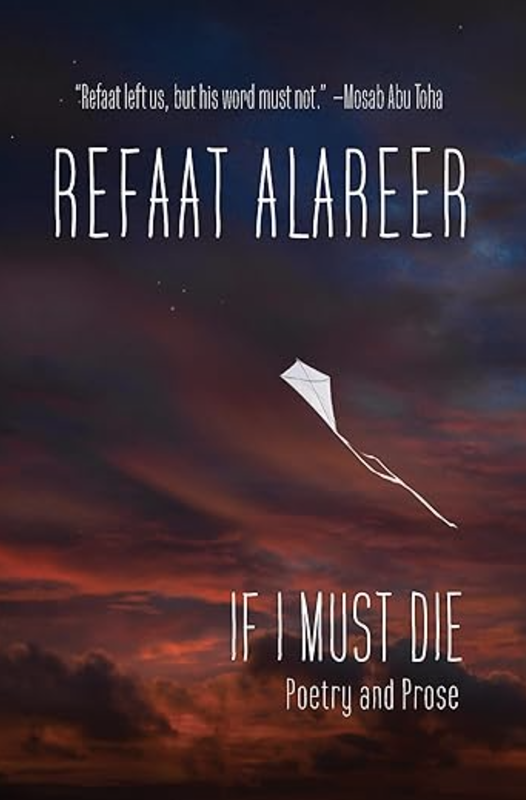Susan Abulhawa Remembers Refaat Alareer: Poet, Teacher, Husband, Father

On December 7, 2013, a Ph.D. student in Malaysia reached out to me by email because he was writing a research paper on a section of Mornings in Jenin. He told me that he had taught my novel at the Islamic University of Gaza, and he hoped to get my thoughts on his thesis. His name was Refaat Alareer. We corresponded on the topic and kept in touch. We became friends and comrades, and I came to love, respect, and value him.
Exactly ten years later, on the morning of December 7, 2023, I awoke to news that Israel had killed Refaat. They targeted the home where he had taken refuge the previous day, and it took a day for news to trickle out of Gaza’s blackout. I sat in front of my screen, red-eyed and in shock, searching for remnants of Refaat in my own life—signed books, notes, photos, messages, and emails.
I quickly discovered that the email in 2013 was not my first encounter with Refaat. I found an earlier message, from 2011, in which I told a friend that I had cried over a beautiful tribute to Vittorio Arrigoni, the Italian solidarity activist who was killed in Gaza. The tribute was written by a Refaat Alareer. I had not made the connection until I went searching for him after Israel killed him.
Much of the correspondence between Refaat and me was conducted over Twitter (now rebranded as X). But my account was permanently suspended in early 2023 after Zionists launched a campaign to have me canceled, and all of those messages were stolen from me. Although that account had contained an audit of my thoughts and activism for at least a decade, I never mourned its loss until I needed to re-read my exchanges with Refaat.
Shortly after Israel launched its genocidal assault on Gaza, Refaat urged me to create a new Twitter account. Always trying to make our case to the world, he said, “we need your insight there,” and he suggested a handle for the account. I immediately did as he counseled and sent the link to him. His response: “Got your first 4 follows [wink emoji].”
I believe some part of him knew what was to come. Still, he was planning for things “after the genocide stops.”
He was smart to have multiple accounts, prepared with backups in case of social media assaults. His mind was unbreakable and beautiful and fine. Online trolls and cancellation campaigns were no match for him. But he had no defenses against bombs. The most dangerous thing he had was “an expo marker,” as he told Ali Abunimah in his last interview with the Electronic Intifada. He said he would throw it at soldiers when they broke into his home. But he would not even get the satisfaction of that imagined small moment of self-defense. Israelis, cowards as they are, targeted him from the sky.
Three days before Israel murdered Refaat, he sent me a video of what remained of his home and the lifetime of memories it held. The video records three and a half minutes of him walking through unimaginable destruction in Tel al-Hawa, narrating the life that used to be, pointing to pieces of things once whole, clean, functional. A sofa, where he had perhaps lounged lazily countless times, maybe with a book, his children climbing on him; a broken window frame that brought breeze and sunshine and kept in the warmth of the family he loved and lived for; a piece of cloth, like the one in the poem he wrote for his daughter Shymaa,“If I Must Die.”
The heartbreak he must have felt is difficult to fathom. Refaat was no stranger to injustice and profound loss. Israel murdered his brother and at least thirty members of his wife’s family in 2014, one of many aerial pogroms committed against Palestine, Gaza in particular. But “this [time] is different,” he told me in a text on October 14. He wrote, “it’s going to be even worse. We are bracing for that. We have no way to defend ourselves.”
I believe some part of him knew what was to come. Still, he was planning for things “after the genocide stops.” In particular, we talked about the Gaza Zoo. It pained him that many of the animals died because they had gone without water or food for weeks. Two days later, on October 16, I messaged to check on him after Israel began bombing Shujaiya. Of the people murdered that day, he said, “it’s my relatives. But I don’t know who. Calls can’t reach.”
In the video, Refaat continues walking, narrating what we can all see but cannot truly comprehend. Hearing his voice in that recording now is strangely soothing, as if he’s not really gone; as if he might answer if I call him. He stops where books are scattered on the ground. “Some of these are mine,” he says, sifting through tattered, torn, and dusty covers.
Refaat believed there was great value in speaking and writing to the people of empire to lay bare our humanity before them.
The first thing he chooses to pick up, the thing he tries to salvage, is a book he finds from his destroyed library. It’s an unabridged copy of Gulliver’s Travels. He had read it a few times, I remember him telling me years ago. In vain he tries to knock off the dust and debris, but he carries it with him nonetheless. I think the loss of his library broke his heart in ways other losses had not. His books were the accumulation of his intellectual labor, years of reading, thinking, and journeying the world through the written word. Books were integral to his identity. His place in the world as a thinker, a teacher, a writer, was anchored to his library. To see it dismantled, discarded, and burned, I believe, turned off the lights in an unreachable part of him.
Over the years, Refaat and I had several discussions about his embrace of English literature instead of Arabic. Having been forced to leave my Arabic education at a young age, I would lament to him that it pained me to have never developed a sophisticated grasp of my poetically charged mother tongue. He agreed, mostly. But he found English more practical and pliable. More importantly, he wanted to master the language of the empire that oppressed him. Always thinking of Palestinian liberation, Refaat believed there was great value in speaking and writing to the people of empire to lay bare our humanity before them.
He believed people were essentially good; that if they could only see what was happening to us, they would stop supporting our colonizers; that if they could see the magnificent beauty of our souls, they might love us. He also wanted to ensure our lives would be recorded despite rampant efforts to erase our presence in the world.
Still, he was uncompromising in his convictions, and never withheld the sting of his tongue against injustice. His integrity and dignity, and the dignity and agency of Palestinians on the whole, were above all else.
As tributes now poured in for Refaat, all our grief mixing together, his poem for Shymaa recited over and over by so many people around the world, I was reminded of another indigenous leader who, like Refaat, was murdered because the light of her being shone too brightly.
Berta Cáceres of Honduras spent her life fighting for indigenous rights and for our deteriorating planet against extractive industries dismembering the earth, damming rivers, killing species, and stealing resources. When she died, the rallying cry of the thousands who loved and followed her was, “Berta no murió, se multiplicó!”
Likewise, Refaat no murió, se multiplicó!
Refaat did not die, he multiplied!
susan abulhawa
August 13, 2024
_______________________________

From If I Must Die: Poetry and Prose, by Refaat Alareer, available from OR Books.